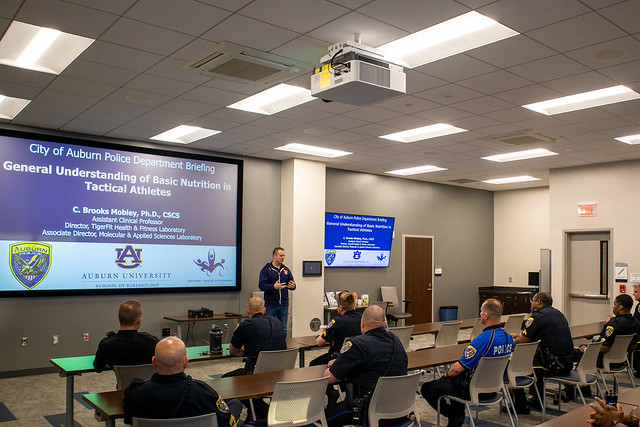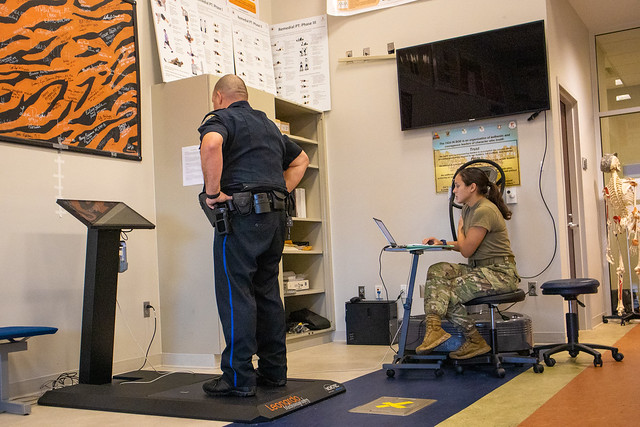Redefining wellness: A partnership between the Auburn Police Department and Auburn University’s Warrior Research Center
Article body
Auburn University’s Warrior Research Center (WRC) has joined forces with the Auburn Police Department to redefine officer wellness – with the WRC focusing on the physical aspects of a police officer’s job.
Every career path has specific occupational hazards – corporate employees may complain of eye strain and truck drivers face dangerous driving conditions; policing is undoubtedly no exception. Extensive research shows the stressors police officers encounter daily lead to a significantly reduced life expectancy, sometimes 10-15 years shorter than in other occupations. Stress, anxiety and disrupted sleep patterns are just a few of the stressors that can wreak havoc on the physical and emotional well-being of police officers.
Researchers in the WRC are working with the Auburn Police Department to answer the question, “How are those same hazards elevated or stacked with additional stressors during a high-risk work incident?”
Some may say, “It’s just part of the job.” However, Auburn Police Department’s (APD) leaders recognize the importance, now more than ever, of redefining officer wellness to be all-inclusive of physical, mental and spiritual health. By leveraging a holistic approach, many of the challenges may be alleviated to improve the organization’s overall health and strengthen the relationship between the Department and the community. Renewing the department’s focus on a program that aligns officers with science-based research, addresses personalized physical fitness needs and boosts mental health through a peer-support program and spiritual health through a non-denominational chaplaincy program will create a better informed, more resilient department.
“The Warrior Research Center works with tactical athletes every day – this includes police, fire and military,” said WRC Director JoEllen Sefton. “Our research is aimed at improving readiness and performance while reducing injury. To do this, we complete research on physical fitness, performance improvements, nutrition, adaptations to heat and more.”
The WRC started with an overall assessment of the level of physical fitness of APD officers. The assessment included a Dual Energy X-Ray Absorptiometry (DEXA) scan to measure bone density, body mass index and muscle density; a cardiac health and endurance test; upper body strength and endurance test; several flexibility tests and some time on the “Leonardo” machine to test balance, grip strength and standing jump height.
“Most officers found their time on ‘Leonardo’ to be a humbling experience,” Sefton said. “Several tests were conducted in physical training gear and then repeated in full uniform. On average, the uniform and equipment add an additional 16-20 pounds of weight to each officer. We need to conduct these studies in full uniform so we can develop protocols that are realistic in a true on-the-job situation.”
Knowing that exercise and diet play a significant role in officer health and wellness, the APD and WRC intend to use the data from the initial assessment to develop new annual PT standards for the department. APD currently utilizes the Alabama Peace Officer Standards and Training Commission (APOSTC) test to measure officer physical fitness annually. The APOSTC test is comprised of push-ups, sit-ups, sprints and a 1.5-mile run.
Some APD officers have experienced on-the-job injuries, such as motor vehicle accidents and gunshot wounds, which require a more singular exercise routine to ensure resiliency and career longevity. As part of the new PT standards, WRC is working to develop individualized fitness routines.
In addition, WRC’s nutritional briefings provide officers with an understanding of basic nutrition in tactical athletes to foster healthy diets. The ‘no one size fits all’ approach considers genetics, body composition, activity level, training motives and diet as opposed to caloric estimators. The WRC is providing safe, personalized nutrition recommendations that will meet the needs of each officer and their lifestyle.
“The Auburn Police Department is proud to partner with Auburn University’s Warrior Research Center in focusing on officer wellness,” said APD Assistant Chief Mike Harris. “Our people are our greatest resource, and this investment in officer wellness will help APD to better serve our community for years to come.”
Body mechanics and ergonomics are other key components of the WRC research project, for example, how officers’ uniforms distribute the weight of their required equipment or how police vehicles are set up as a mobile office. APD patrol officers are assigned to 12-hour shifts on four-day rotations, spending 12 hours a day at times in their patrol vehicle. In comparison, the vehicle’s suspension, brakes and engine may be tuned for police response, while very few interior components are set up for continuous driving or sitting rigors.
In addition, the officer’s computer, or Mobile Data Terminal (MDT), is generally an add-on component in the vehicle requiring officers to twist, turn and strain at times to operate properly. Auburn University’s engineers and ergonomics experts are set to evaluate and recommend improvements for the mobile office environment.
Officers carry as much as 20-plus pounds of additional equipment with their body armor, body-worn cameras, handcuffs, weapon, ammunition and other less-lethal systems such as the Axon Taser 7. With officers, both young and older, suffering from lower back, hip and other joint-related injuries, the WRC will review data collected from other studies and combine that with testing and evaluation of “load bearing vest (LBV)” options.
Studies show LBVs more evenly distribute equipment weight and take the load off officer’s hips and lower back. This data will be combined with the vehicle ergonomics analysis for review and consideration.
This project is ongoing, and additional developments are expected in the coming months.
Related Media
Media interested in this story can contact Communications Director Preston Sparks at (334) 844-9999 or preston.sparks@auburn.edu.
Auburn University is a nationally ranked land grant institution recognized for its commitment to world-class scholarship, interdisciplinary research with an elite, top-tier Carnegie R1 classification, life-changing outreach with Carnegie’s Community Engagement designation and an undergraduate education experience second to none. Auburn is home to more than 30,000 students, and its faculty and research partners collaborate to develop and deliver meaningful scholarship, science and technology-based advancements that meet pressing regional, national and global needs. Auburn’s commitment to active student engagement, professional success and public/private partnership drives a growing reputation for outreach and extension that delivers broad economic, health and societal impact.







